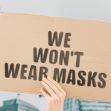The Michigan Supreme Court recently ruled that Governor Gretchen Whitmer’s executive orders regarding COVID-19 restrictions are unconstitutional. They said that she is not allowed to add or extend restrictions after April 30. Whitmer had said that the state needed more time in order to "allow for an orderly transition during which some responsive measures can be placed under alternative executive authority and the Governor and Legislature can work to address many other pandemic-related matters that currently fall under executive orders." Michigan’s Republican-controlled legislature had passed a bill that would not have extended Whitmer’s order after April 30. Regardless, Whitmer extended her restrictions through executive order. Whitmer used the Emergency Management Act of 1976 (EMA) and the Emergency Powers of the Governor Act of 1945 (EPGA) as her basis for having the authority to extend the order. Whitmer gave a statement when the Michigan Supreme Court denied her the ability to extend the order or issue new orders for restrictions: "(The) Supreme Court ruling, handed down by a narrow majority of Republican justices, is deeply disappointing, and I vehemently disagree with the court's interpretation of the Michigan Constitution. Right now, every state and the federal government have some form of declared emergency. With this decision, Michigan will become the sole outlier at a time when the Upper Peninsula is experiencing rates of Covid infection not seen in our state since April." Whitmer has faced a lot of criticism regarding her lockdown measures. There were even armed protestors who went to Michigan’s Capitol in April to protest her restrictions.
In order to keep people safe during crises like this one, both federal and state governments have what are called police powers. According to an HHS website for Public Health Emergency (PHE), police powers give the government has the ability to do things like “making grants; entering into contracts; and conducting and supporting investigations into the cause, treatment, or prevention of the disease or disorder.” The federal government is fairly limited regarding police powers in a state of emergency; instead, this type of power is usually left to the states. Examples of places where police powers are being used are New York and California, where lockdowns have been put in place to prevent the spread of COVID-19. They have also done things like close down bars that do not serve food or only allow restaurants to have drive-through or carryout service.
Executive powers at the state level vary from state to state. For example, in New York, a state of emergency can only last for 30 days or until it is lifted, whichever comes first. However, it can be extended for 30 days at a time. According to Fox News, in California, a state of emergency can last for up to 180 days, “unless the state’s Office of Administrative Law approves a readoption, which can only be done twice, and each readoption period is just 90 days.”
How these restrictions are enforced and penalties for not following these restrictions also vary from state to state. In New Jersey and Montana, violating quarantine can be punished with a fine between $10 and $500. However, in Mississippi, the penalty for violating quarantine can be a fine up to $5,000 and up to five years in prison.
Using emergency powers allows a government to respond swiftly to a disaster. It remains to be seen how well Michigan will be able to deal with the coronavirus pandemic with the Governor’s hands tied by the legislature and the courts.






